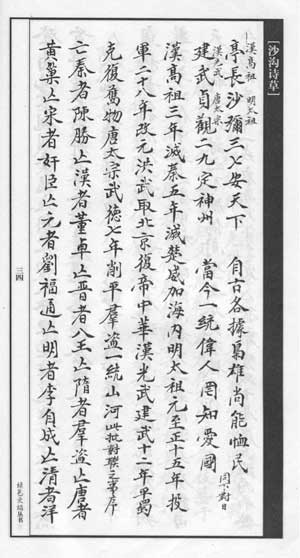Composed during the first ten days of Dhu al-Hijja, 1338 AH (August 1920)
Most of Ma Yuanzhang’s poems, collated in several different collections that circulate amongst Jahriyya communities in Ningxia, Gansu and Yunnan today, are couplets written to mark the death anniversaries of former shaykhs and notables of the Jahriyya tradition. However, one set of poems included in Rough Poems from Shagou (Shagou Shicao 沙沟诗草) is in a more sophisticated literary style. These longer poems written on the 1st, 3rd and 5th days of the 7th lunar month of 1920, which in that year fell in the first ten days of the month of the pilgrimage (Ar. Dhu al-Hijja). This is the period of the Hajj, culminating with the festival of sacrifice commemorating the story of Ibrahim and Isma’il.
The inclusion of a preface with the set of poems suggests that it may have been composed for his friends and political allies in Gansu, a gift of his personal reflections on the significance of the pilgrimage season and the festival of Qurban. In the context of the partially successful attempt by an alliance of Gansu indigenous military leaders to have the encumbent Anhuiese governor general Zhang Guangjian ousted from the province and replaced by a local Muslim military official, the poems can be understood as a rhetorical justification for the need for political change.
|
1st of the 7th lunar month of the year geng-shen The battle for the throne between the eight princes has begun. * 3rd of the 7th lunar month of the year geng-shen A great wind came forth, * While enjoying the mountain scenery, I gaze upon harvested fields. * 5th of the 7th lunar month of the year geng-shen It is not easy, for a layman, to live as a recluse. * A response after reading Account of the Flight of the Sage To glean a message from the books and records, the strength of the Manchu Qing was not on a par with the barbarian Jin 金 and Yuan. All the more for Jin 晋 and Song, who fled south of the River and founded a new court that kept the Chinese system alive for several centuries. The Ming Prince Fu transported his court to the southern capital but in less than two years his court was destroyed and he himself was taken prisoner. Though this is put down to the deliberate punishment of heaven, it is what happens when men set sail against the tide. * When Tang Wu led a revolution, * Preface to this collection Gaozu of Han destoyed Qin within three years, and Chu within five. Taizu of Ming embarked on his military career in the 15th year of the Zhizheng reign of the Yuan dynasty; in the 28th year, he established his own calendar under the Hongwu reign, took Beijing and revived the Chinese dynastic order. Guangwu of Han conquered Shu in the 12th year of the Jianwu reign, regaining control over his old possessions. Tang Taizong wiped out all the bandit parties in the 7th year of Wude, spreading one law across all the mountains and rivers. * |
庚申七月一日 八王爭權起亂哄, * 庚申七月三日 大風起兮塵飛揚 , * 登高玩景觀刈麥, * 庚申七月五日 以民為隱尚非易 * 閱聖安本紀有感而作 閱籍載籍滿清之勢力不如五胡金元甚而晉宋敗竄江佐立朝數百年以存中華之制。明福王繼統南都不二載國滅身虜雖曰天意抑亦人謀之不藏偶。 * 湯武革命一戎衣而天下大定 * 此批對聯之事序 漢高祖三年滅秦五年滅楚威加海內明太祖元至正十五年投軍二十八年改元洪武取北京復帝中華漢光武建武十二年平蜀克復舊物唐太宗武德七年削平群盜一統山河 * |
The words at the bottom of the fifth line read ‘Preface for this set of couplets’, suggesting that the series of poems preceding it once circulated as a set.
References
Ma Yuanzhang. 2000. Shagou shicao 沙沟诗草 (Poems from Shagou). Lanzhou.

